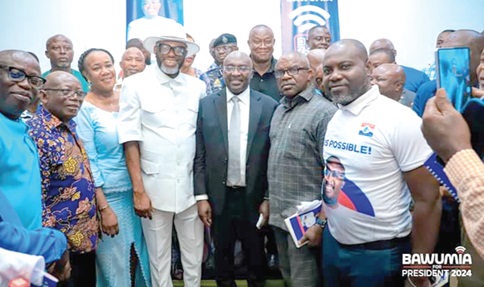
My govt will be business-centred — Dr Bawumia
The Vice-President, Dr Mahamudu Bawumia, has assured the business community in the country that his government will prioritise the business sector.
Dr Bawumia, who was speaking to members of the Ghana Union of Traders Association (GUTA) as part of his engagement with the various groups and professional bodies, said a credit system for individuals to have a credit score would be part of reforms to be introduced by June this year.
Also, he said, he would reduce government expenditure should he become President because increased government expenditure led to increased borrowing, which also caused interest rate to go up.
To that end, he said, “I want us to move a lot of government expenditure from government to the private sector and once the private sector does that, government expenditure will minimise.”
Engagement
The meeting between Dr Bawumia, who is also the flag bearer of the ruling New Patriotic Party (NPP), and members of the GUTA, which is a business community with about 84 member associations, was to get their inputs into the preparation of the new NPP manifesto.
Some of the concerns raised by members of the association were the continuous harassment of staff of the Ghana Revenue Authority (GRA) and other task forces, high cost of levies, fees and taxes at the ports, increased demurrages, saiko activities by some fishermen, fluctuation of the exchange rate and foreigners virtually taking over retail businesses in the country.
Accompanying Dr Bawumia were the National Chairman of the NPP, Stephen Ntim, a Deputy Minister of Trade and Industry, Michael Okyere Baafi; the National Women’s Organiser of the NPP, Kate Gyamfuah; the Greater Accra Minister designate, Titus Glover, and the Minister of Public Enterprises, Joseph Cudjoe.
Access to credit
Explaining further, Dr Bawumia, who spoke in Twi interspersed with English, said having access to credit in the country had been his dream but its introduction had not been possible due to the unavailability of the critical infrastructure to roll that system out.
“We did not have a unique identity, the reason the Ghana Card was introduced, same way we brought the digital address system. Now all the databases have been integrated and the key to a credit system with individuals having a credit score in the country will come by June,” he announced.
On exchange rate, Dr Bawumia said he intended to introduce a new port tax system and a gold purchase programme based on which the Bank of Ghana (BoG) would buy more gold to back the currency of the country.
He said the cedi would ultimately have strength sustainably, and coupled with the lower government expenditure, help the country. Dr Bawumia, who was responding to concerns raised by members of GUTA, acknowledged that high cost of doing business was as a result of import duties and taxation.
He, therefore, told members of the GUTA that “my major goal is to make Ghana one of the most business-friendly economies in the world because when business is booming, the country makes progress and vice-versa.”
In that regard, the NPP flag bearer said he would bring new policies by introducing a new flat tax system should he become the president of the country. From independence, he said, “our tax system creates room for corruption and was even more complex now.”
He said many business people had no idea how much they were to pay as tax, while they could not also calculate their taxes. “It is the reason I am saying to begin with, we will give everyone a tax amnesty so we start on a fresh slate.
Currently, Dr Bawumia observed that many containers were being diverted to Lome, Togo, where they cleared the goods and smuggled it into Ghana because of the high port duties in Ghana.
He said when he became President, duties at the Tema port would not be higher than that of the Lome Port as a matter of policy.
Concerns
Earlier, the President of GUTA, Dr Joseph Obeng, indicated that in the past, political parties imposed their manifestos on the people without considering the concerns and aspirations of the citizens.
That “unilateral approach”, he said, had led to a disconnect between governments and the governed, thereby hindering accountability and trust in the political process. As we look to the future, Dr Obeng said it was imperative that all political parties actively sought and incorporated the inputs, concerns and priorities of Ghanaians into their manifestos.
By doing so, he said, “we can foster greater accountability, transparency and inclusivity in our democracy by ensuring that the voices of the people are heard.”
